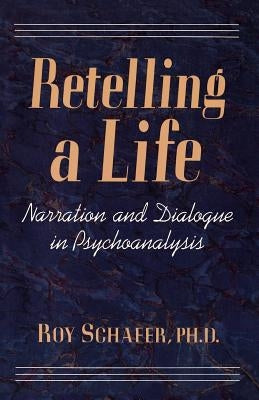Description
Here is the long-awaited new book by the influential, always provocative psychoanalyst, Roy Schafer. It focuses on a vacuum that has developed between psychoanalysis and critical thinkers in the social sciences and humanities. Schafer's goal is to weave psychoanalytic discourse into the tapestry of modern trends in intellectual history, notably linguistic and hermeneutic approaches to interpretation.The manner in which we "narrate" our lives is the central theme of psychoanalytic discourse and a critical issue for all of us, Roy Schafer argues. Narrating, giving an account, presenting a version: these terms make up the core vocabulary of the narrative approach. From this perspective, Schafer offers a new understanding of such diverse issues as men's struggle against sentimentality; women and power; happiness and failure; and analysts' sublimated love for their patients.Whether he's redefining the self, reinterpreting Freud, or counteracting the stereotype of the aloof, authoritarian, and patriarchal analyst, Schafer's rich observations will inform and stimulate not only analysts but all those interested in psychoanalytic thought as an intellectual current of our times.
Author: Roy Schafer
Publisher: Basic Books
Published: 04/29/1994
Pages: 352
Binding Type: Paperback
Weight: 1.01lbs
Size: 8.54h x 5.58w x 0.90d
ISBN13: 9780465069385
ISBN10: 046506938X
BISAC Categories:
- Psychology | Psychotherapy | General
- Psychology | Movements | Psychoanalysis
- Medical | Psychiatry | General
Author: Roy Schafer
Publisher: Basic Books
Published: 04/29/1994
Pages: 352
Binding Type: Paperback
Weight: 1.01lbs
Size: 8.54h x 5.58w x 0.90d
ISBN13: 9780465069385
ISBN10: 046506938X
BISAC Categories:
- Psychology | Psychotherapy | General
- Psychology | Movements | Psychoanalysis
- Medical | Psychiatry | General
About the Author
Roy Schafer, Ph.D., is a training and supervising analyst at Columbia University's Psychoanalytic Center for Psychoanalytic Training and Research. He was the first Freud Memorial Professor at University College in London and has been honored twice by the American Psychological Association for his contributions to psychoanalysis and professional knowledge. He lectures extensively throughout the United States and abroad and is the author of, among other works, A New Language for Psychoanalysis, Aspects of Internalization, and The Analytic Attitude (Basic, 1983).

